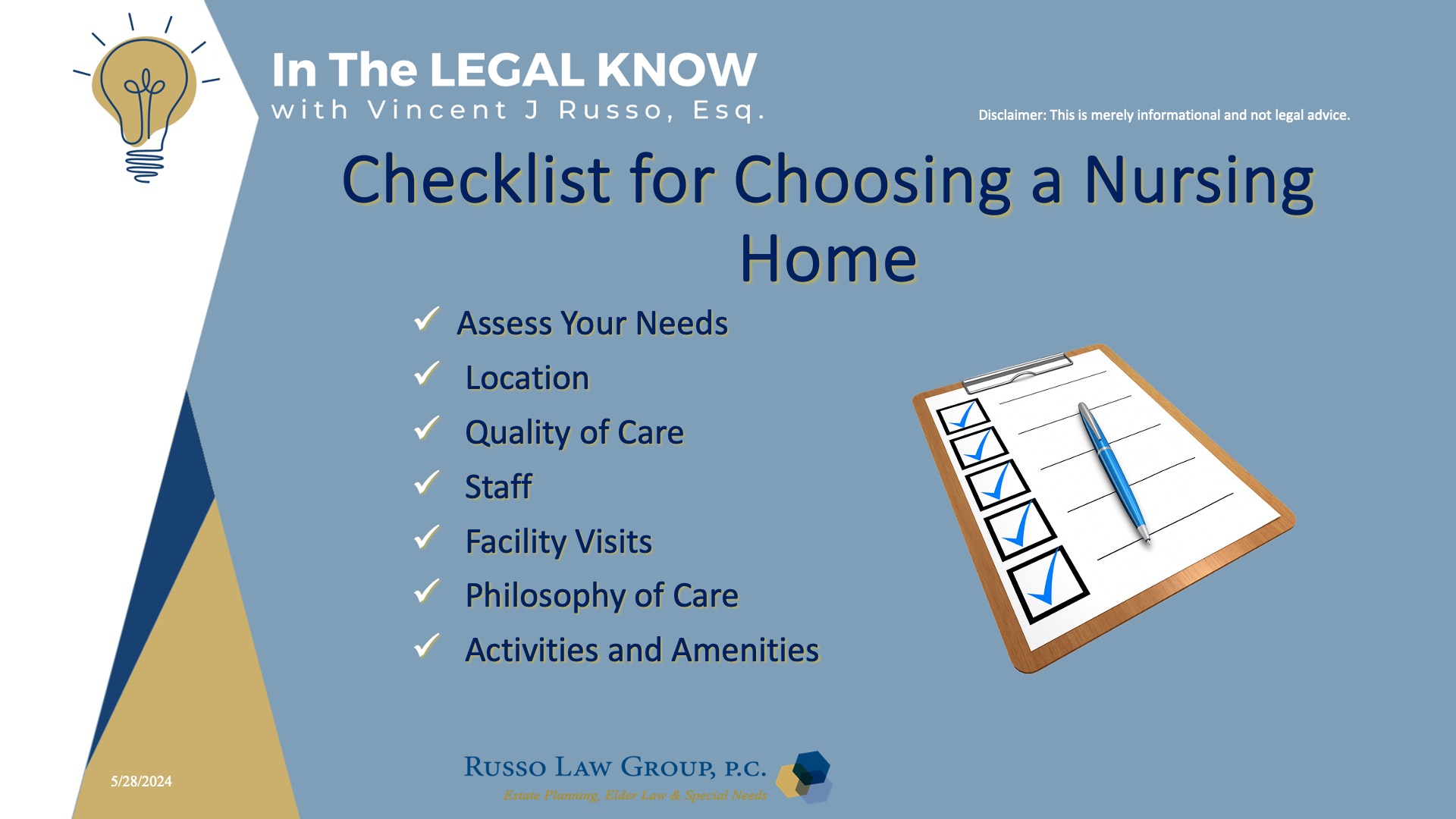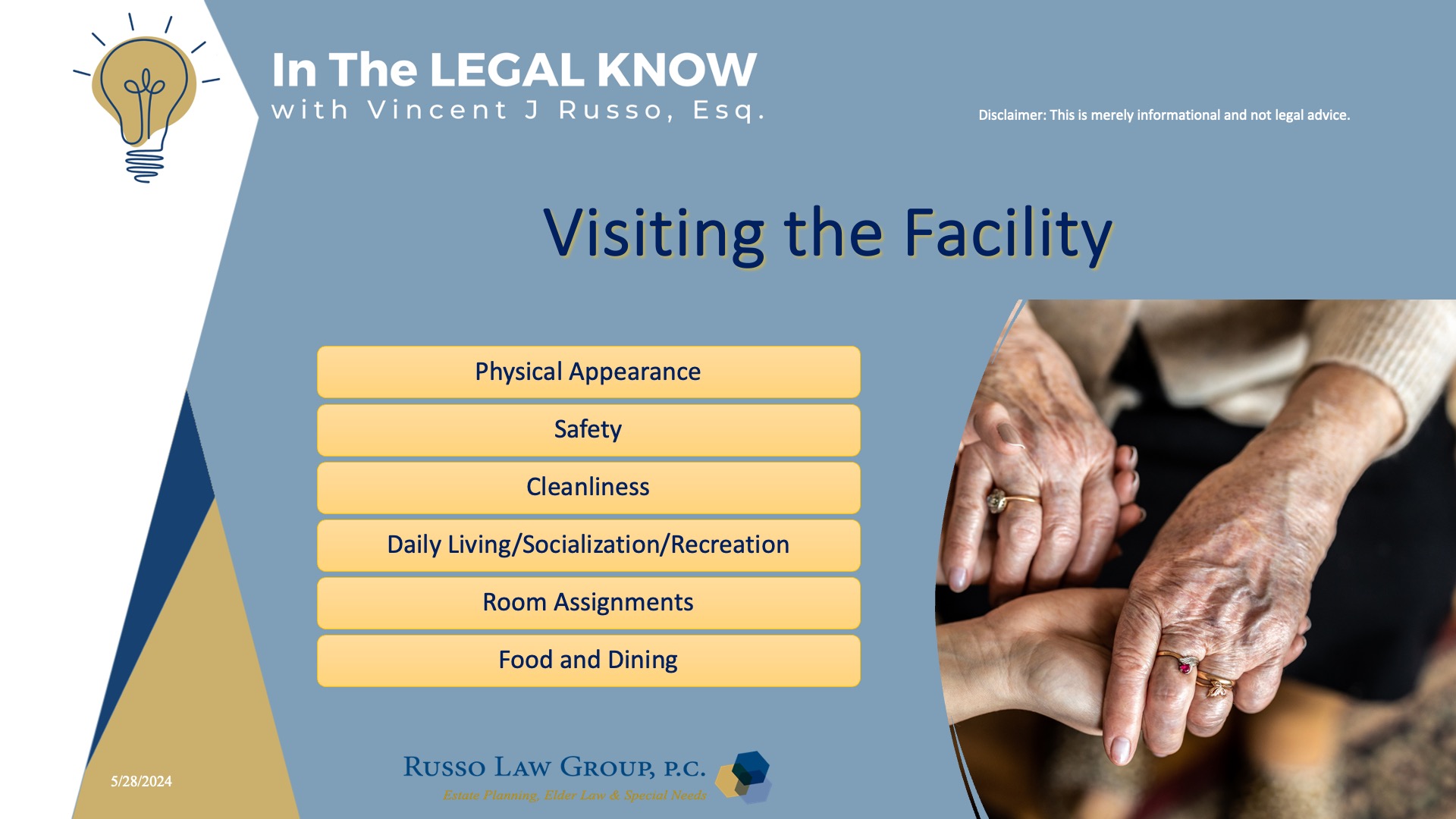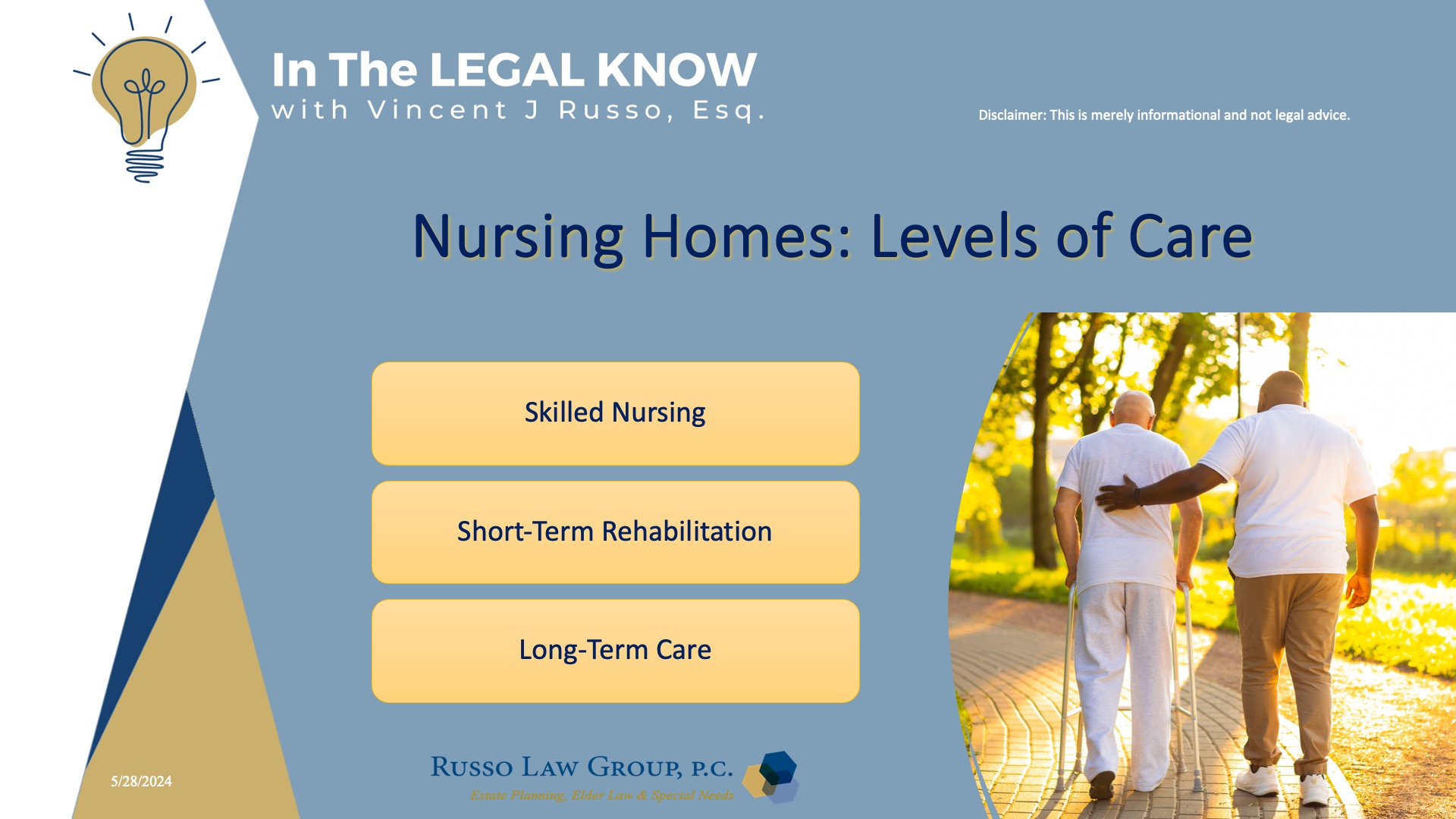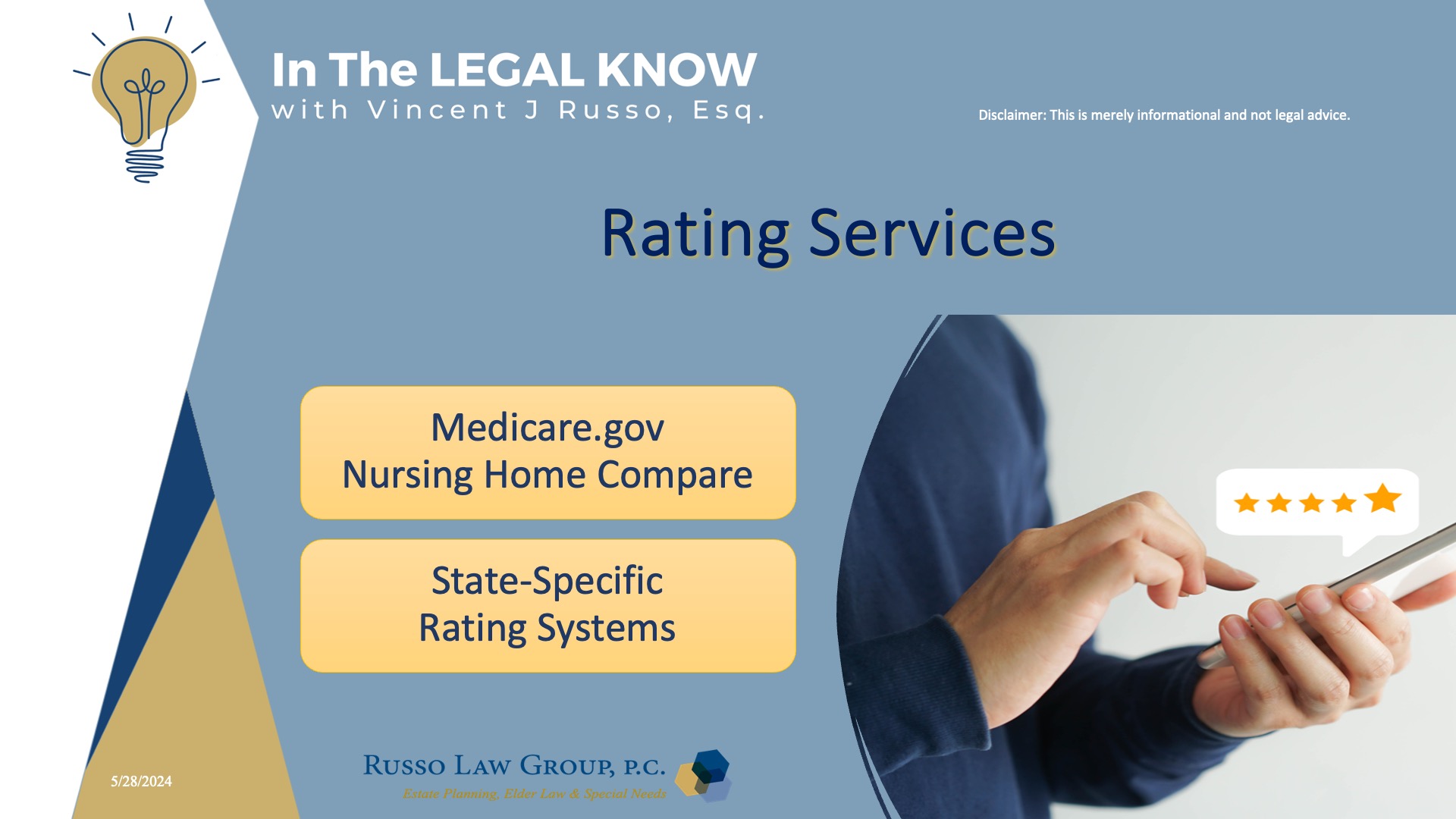Many people do not realize that Medicaid can recover costs from your estate after you…
This originally aired on the Catholic Faith Network’s show CFN Live: https://youtu.be/5yGEY88ifog
How does one approach this all-important decision?
 First, is to decide whether a nursing home is the appropriate setting for your loved one. Does your loved one need the level of care that only a nursing home can provide? Other options may be care at home with necessary services and care being brought into the home or residing in an assisted living residence.
First, is to decide whether a nursing home is the appropriate setting for your loved one. Does your loved one need the level of care that only a nursing home can provide? Other options may be care at home with necessary services and care being brought into the home or residing in an assisted living residence.
Selecting a nursing home for yourself or a loved one involves careful consideration of several factors to ensure the facility meets your needs and preferences.
Nursing homes are places to live where care is available for people of all ages who need 24-hour nursing care and supervision outside of a hospital. Although all nursing homes must provide certain basic services, some provide specialized care.
How does one approach the selection process?
Finding a nursing home that will best meet your needs can be a difficult and time-consuming task. The more information you have, the easier the task will be and the more likely you will find the nursing home that is right for you. Making the decision that a nursing home is the right place for you and looking at different homes to identify those that best meet your needs, from the services they offer to their cultural environment, is important to do.
There are several ways to obtain information. With the help of your doctor and the hospital discharge planning staff (if you are hospitalized), realistically assess your medical, nursing, and social needs and seek facilities that can best meet those needs. For example, a facility with a strong physical therapy department might be important if you are recovering from a stroke.
Discuss nursing home placement with your family so that all possibilities can be fully explored, and your feelings are known. Watch for articles in newspapers and magazines and for television programs that discuss nursing homes. Pick up information on nursing homes from social service agencies or local aging and health departments. Contact community groups and advocacy groups.
Meet with a senior consultant, geriatric care manager or an elder law attorney to provide you with information regarding nursing homes in your area and answers to your questions about nursing homes and their services.
What are the key considerations?
Checklist for choosing a Nursing Home:
- Assess Your Needs: Determine the level of care required (e.g., skilled nursing, memory care).
- Location: Choose a location close to family and friends to facilitate visits.
- Quality of Care: Look for a facility with a high standard of medical care, cleanliness, and safety.
- Staff: Evaluate the staff-to-patient ratio and the qualifications of the medical personnel.
- Facility Visits: Visit multiple facilities to observe the environment, activities, and interaction between staff and residents.
- Philosophy of Care: Ask about the facility’s care philosophy and how it aligns with your needs.
- Activities and Amenities: Check for activities and amenities that match the resident’s interests and needs.
What should one look for when visiting a nursing home?
Visiting any nursing home that you might consider as a future home is one of the best ways to determine if the facility is suitable for you. Call the nursing homes you are interested in and make an appointment to meet with the admissions staff.
Each nursing home has its own policies and procedures, but all must follow certain State and Federal regulations with respect to residents’ rights. A copy of the nursing home’s policies should be available upon request. Following is a list of some policies to check:
- the use of personal belongings and furniture
- the availability of ethnic foods or special diet preferences
- room assignments and changes
- reserving a bed if transferred to a hospital/therapeutic leave
- emergency procedures
- self-care
- phone calls
- leaving the facility for short visits with family or friends
- procedures for handling theft
- complaint procedures
- access to personal funds
When you visit a nursing home, look for its license to operate. The license should be prominently displayed, usually in the lobby. It is also very important to see firsthand what the environment of the home is like. This will also give you an opportunity to ask questions on the care and services that the nursing home provides and clarify any issues with regard to placing an individual in the nursing home.
During the visit, be observant of the interaction between caregivers and residents and take a good look at everything!
Some important areas to consider are as follows:
Ask questions of key personnel at the facilities you visit — the nursing home administrator, admissions director, social work director, nursing director and medical director, for example. Make your own judgments. A caring nursing home should welcome both your desire to visit and the questions you ask.
Are all nursing homes the same in the care they provide?
Nursing homes primarily provide three types of services: Skilled Nursing or medical care and related services; Short-Term Rehabilitation needed due to injury, disability or illness; and Long-Term Care, which is health-related care and services (above the level of room and board) not available in the community, needed regularly due to a mental or physical condition.
It is critical to understand the level of service that will be provided to your loved one.
For example, if your loved one has Alzheimer’s disease or dementia, what services are available and how to they staffed to take care of those residents. If your loved one needs a ventilator, does the nursing home have an approved ventilator-dependent bed available?
Are there rating services available?
Your State, such as New York, may have a Nursing Home Profile which will provide you information on nursing homes in your state and the quality of care they provide.
The care the nursing homes provide can also be compared on the Federal Medicare website (Nursing Home Compare).
Rating Services
- Medicare.gov’s Nursing Home Compare offers detailed ratings for Medicare- and/or Medicaid-certified nursing homes, including health inspections, staffing, and quality measure ratings. This service provides a good starting point for assessing nursing home quality.
- State-Specific Rating Systems: Some states may have their own rating systems for nursing homes. In New York State (NYS), you can check with the New York State Department of Health for state-specific ratings and information on nursing homes.
What are the financial considerations?
This is another major consideration as to how the resident is going to pay for the nursing home care. One would look to Medicare, Medicare Supplemental Insurance and Medicaid to cover those expenses.
Selecting the right nursing home is a critical decision that requires thorough research and consideration.
Utilize available resources and checklists, like those found on A Place for Mom and Medicare.gov, to guide your evaluation process. Additionally, consulting with healthcare professionals and visiting prospective nursing homes in person are essential steps in making an informed decision.
We hope you found this article helpful. Contact our office today at 1 (800) 680-1717 and schedule an appointment to discuss what makes sense for you and your loved ones.








Please send some information to my email
Hi Shelley:
Please feel free to take a look at our website and go to the “Resource” tab. You will see there are “Free Planning Guides” that you can request if interested.
Thanks for reaching out.